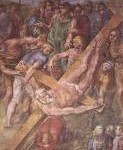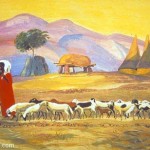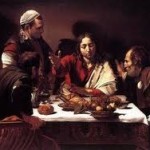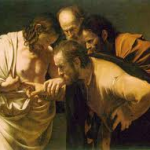Sixth Sunday of Easter – Cycle A
Reflecting on 1Peter 3:15-18
Always be ready to give an explanation to anyone who asks you for a reason for your hope.
Isn’t that beautiful? The author of the second reading today is talking to the earliest converts to the faith, urging them to have a good reason on hand for why they are hopeful in their terrifying first-century world.
I like to think about those earliest Christians. According to tradition, every single one of the apostles listed in the Gospels (except for Judas) experienced torture, and most of them martyrdom, because of their hope in Christ. They “took on Christ” during the most violent years of the Roman Empire. They faced up to Nero and Trajan and Domitian, and often converted their own jailers, who went to their deaths with them.
I recently saw the shatteringly beautiful movie Of Gods and Men. It tells the true story of eight Cistercian monks who chose to stay with their Muslim friends in a besieged Algerian village in 1997. Two eyewitnesses who survived recorded their memories of the agonizing community meetings that took place before the abduction and murder of the other members.
Why did they stay when they knew their lives were in imminent danger? We know from the survivors that the love of Christ compelled them. Their love for their neighbors, whom they doctored, and cared for, and worked side by side with, gave them the strength to face their radical Islamist assassins when they came for them one dark and freezing night.
The Christ who called them to Himself was the reason for their hope. And hope does not disappoint.
What would YOU like to say about this question, or today’s readings, or any of the columns from the past year? The sacred conversations are setting a Pentecost fire! Register here today and join the conversation.
I have come to light a fire on the earth; how I wish it were already burning (Lk.12:49).





